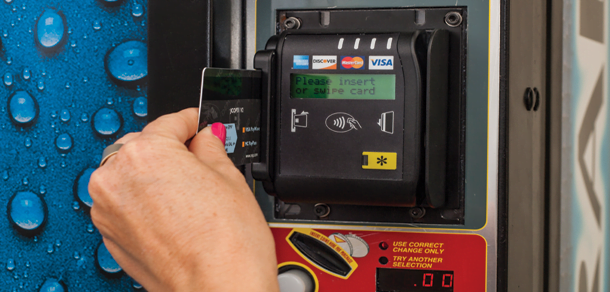
Maximizing tender options key to upping overall sales
Debit and credit cards, as well their mobile equivalents, are giving campus cards a run for their money at vending machines on many campuses across the country.
Although providers of traditional closed-loop campus ID card systems may be losing their once exclusive grip on cashless vending sales, most say the migration to open-loop payments is contributing to a rising tide in unattended sales. A generation of students weaned on plastic has easier access to beverage and snack machines, and campus visitors can tap or swipe their credit and debit cards rather than seek out cash or potentially forego the purchase altogether.
But the closed-loop, declining balance account remains viable and is still the method of choice in dining halls, laundries, copying and printing environments.
“Vending is continuing to grow on campus,” says Dan Gretz, senior director for market development at Blackboard Transact. “The vending providers like Canteen and Coca-Cola are regularly deploying card readers that take both the campus card and the credit and debit cards on all the vending machines on campus, not just those in the high-traffic areas.”
[pullquote]Vending providers like Canteen and Coca-Cola regularly deploy readers that accept both campus cards and credit and debit on all campus vending machines, not just those in the high-traffic areas.[/pullquote]
Today, it seems almost essential to consider open-loop payment. According to research from the Student Monitor, 52% of students name debit and credit cards as their preferred payment method.
Until recently, credit cards for vending weren’t even in scope. Traditionally, schools would put dedicated readers from their campus card vendor on vending machines to accept the campus card. But with rising student use of credit and debit cards, vending providers saw the opportunity to expand sales and began adding a separate, open-loop card reader to machines on campus.
Deploying two card readers on a single vending machine was not the most elegant solution and certainly not the best option from a user’s perspective. “It wasn’t clear to users which reader they should swipe or tap their card to complete the transaction,” explains Gretz.
Today, vending readers are available that accept both the campus card and branded credit and debit cards.
Blackboard has adopted the more agnostic approach to payments by allowing campuses to grow their base of revenue-producing vending machines, while the open-payments system is more accommodating to students and campus visitors accustomed to using plastic, says Gretz. Still, he stresses that Blackboard’s core solution remains closed-loop, declining balance accounts.
James Lawrence, vice president of vending and campus markets for wireless payments processor Apriva, says the company entered vending in the higher education space three years ago offering an integrated card reader that could process payments from both campus cards and credit/debit cards.
“Years ago, it was strictly cash and coins at campus vending machines,” says Lawrence. “Then the campus card companies began the cashless trend by offering their own proprietary reader that would accept campus cards only. They would sell them to the vending machine providers for $1,100 to $1,200 a piece. That was acceptable because the readers created significant value for the campuses and the vending contractors.”
Today a single reader can accept campus cards, credit cards, debit cards, gift cards as well as contactless options such as Apple Pay or Samsung Pay all on one device. “All at about half the cost of the proprietary readers, that’s a game changer because you now have the added value of all payment types at a substantially lower cost to the campus,” says Lawrence.
Because Apriva enjoys an economy of scale, it can offer its all-in-one payment device for less than the proprietary readers designed for campus cards, he explains. In other words, they sell readers to many markets and are not confined to a set client base like campus card providers. Thus they can produce higher volumes of readers while reducing production costs.
Lawrence says that the reduced unit costs enables campuses to equip twice as many machines and increase revenues from vending commissions. Apriva, however, does not consider itself a competitor to the campus card companies because it has partnered with most of them to provide gateway services via its card reader. Readers recognize if a transaction should be routed to a campus card server or to MasterCard and Visa.




